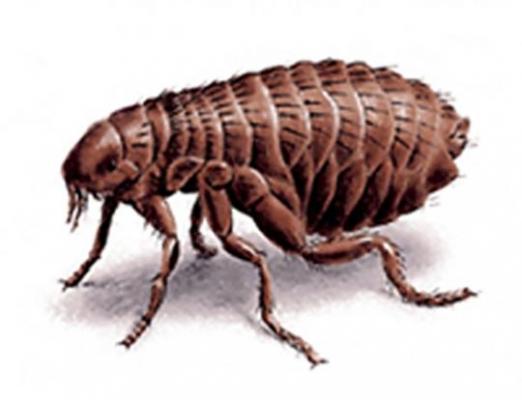Typhus Cases Surprise Edna
By John Meng Publisher/Editor It may not be the bubonic plague, a flea-born disease that is estimated to have killed 75 to 200 million people and reduced Europe’s population by up to 60 percent in the 14th Century, but City of Edna officials are concerned by two surprising cases of typhus.
Like the plague, as well as many other diseases, typhus is spread by fleas and it seems to be making a comeback in populated areas such as Austin, and Jackson County could be next. A second case of typhus has been found within a week in the Flag City.
Typhus is caused by the rickettsia bacteria, affects both dogs and humans, and is spread primarily through fleas, ticks or body lice. The blood-sucking creatures deposit feces on the skin of their host as they feed, where it is transmitted to the bloodstream through scratching or other direct contact.
“Typhus is a disease which is carried by fleas and can sometimes infect humans,” says Dr. Holly Kana of Lakeway Veterinary Clinic. “Fleas cause so many issues just from being on our pets, not just discomfort from scratching, but they carry other diseases too.”
The unfortunate aspect of these human cases of typhus, explains Kana, is that fleas are an easily preventable problem.
“We can use sprays. We can use topicals. We can use oral medication. They are easy to treat and easy to get rid of if you are using the correct methods,” she said.
But typhus is not a disease typically seen in animals and very rarely in humans.
“Typhus is not really on the radar. In my professional career, I have never heard a case of typhus in humans and I’ve never seen a case of typhus in an animal.”
Brad Ryan, Edna director of public works, recently advised the city council that the chemicals the city uses to spray for mosquitoes is also effective against fleas.
“We’ll be making an extra round of spraying to help against the fleas,” he said.
According to Texas Department of Health Services (DSHS), from the 1940s through the early 2000s, highly endemic areas of typhus were limited to the lower Rio Grande Valley and the Coastal Bend area; however in the past 10 years, new areas of endemicity have emerged in Bexar, Harris, and Travis counties, among others.
DSHS statistics reveal that Jackson County had reported zero cases typhus between 2008 and 2018.
The world is host to more than 2,000 species of fleas, and they are a problem almost everywhere. Most common is Ctenocephalides felis, the ‘cat flea.’ Despite its name, the cat flea affects both dogs and cats, as well as their owners, and wild animals such as raccoons and skunks.
To protect yourself and your family from flea-borne typhus, DSHS recommends: Clean your yard so that rodents, opossums, and stray cats cannot live there; remove any brush or trash, keep the grass mowed, and keep firewood off the ground; do not leave pet food out at night as this attracts other animals; prevent rodents from living in your house; treat for fleas before you begin rodent control in your house or yard. Otherwise, when the rodents die, the fleas will search for new hosts; if you own pets, control the fleas on them regularly. If they come in contact with infected fleas, they could bring them home to you.

